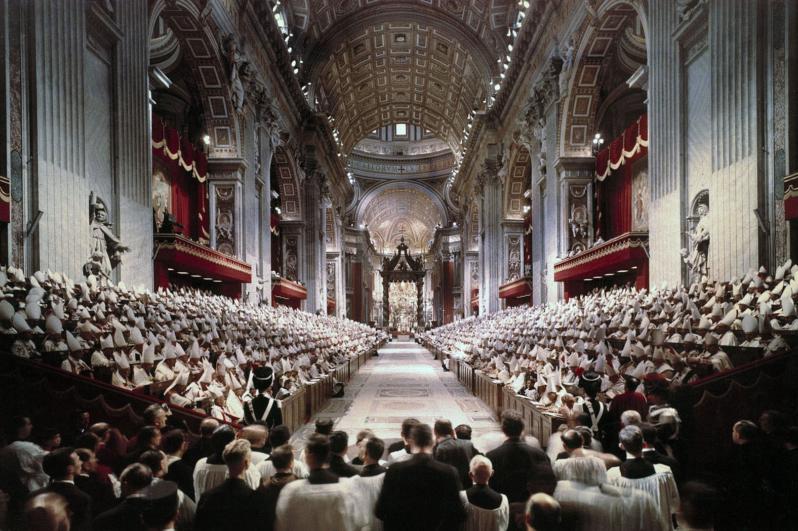St. John's Seminary webinar reflects on ecumenism after Vatican II
BRIGHTON -- To mark 60 years since the opening of the Second Vatican Council, St. John's Seminary dedicated one of its monthly webinars to a central theme of the council: the need for ecumenism, or the effort to foster visible unity among separated Christians.
The featured speaker was Father Joseph Thomas, the chaplain of Mercer House, an apostolate of the Prelature of Opus Dei in Princeton, New Jersey. His presentation, "Vatican II: The Church's Place in the Modern World," drew on a book he edited, "Church and Communion: An Introduction to Ecumenical Theology," by his dissertation director Philip Goyret. The webinar, which was attended by over 80 people, took place on Feb. 15, and the book was released on Feb. 18.
Oct. 11 of this year will be the 60th anniversary of the opening of Vatican II. Unlike previous Church councils, it was not called to address a specific doctrinal error or disagreement, but rather out of the more general sense that the Church was in need of renewal in the face of so many changes in the 20th century.
In the years leading up to Vatican II, Father Thomas said, theologians realized that the Church, like the sacraments, is both a sign and a means of grace.
"The Church can be considered a sacrament, since we visibly manifest Christ, while, at the same time, she's a means by which grace becomes present," he said.
He said that unity is "a property and also a sign of the Church."
"Christ's proverbial 'prayer for unity' at the Last Supper reminds us that unity among Christian believers is an essential part of the Church's evangelizing mission," he said.
He pointed out significant moments of division in the history of the Church, taking place roughly every 500 years: the separation of ancient Eastern churches from communion with Rome in the fifth century, the Great Schism between the East and West in 1054, and the Protestant Reformation in the 1500s.
The Catholic Church was slow to join the modern ecumenical movement of the late 1800s and early 1900s. Pope Pius XII's 1943 encyclical "Mystici Corporis" affirmed that the Catholic Church is the Mystical Body of Christ. The Holy Office's 1949 instruction "On the Ecumenical Movement" marked the beginning of the Church's official participation in ecumenism. But Catholics still generally looked upon "separated Christians" with suspicion and mistrust.
It was in this context that the Second Vatican Council opened, with ecumenism being one of Pope John XXIII's priorities.
One of the documents resulting from Vatican II was "Lumen Gentium," the Dogmatic Constitution on the Church, which Father Thomas referred to many times in his presentation. "Lumen Gentium" confirmed that the Church "subsists in the Catholic Church," but acknowledged that "many elements of sanctification and of truth are found outside of its visible structure."
Vatican II also produced the 1964 Decree on Ecumenism, "Unitatis Redintegratio," which spoke about unity as both a gift and a mission of the Church. Father Thomas said this document is a reminder that unity needs to be restored and renewed, but not brought into being for the first time.
He emphasized that unity is not just a future goal, but also a present reality.
"Authentic ecumenism always starts with this awareness, that it's not simply about seeking unity, it's about recognizing and bringing to fulfillment the unity which already exists. It's a gift which Christ has given to his Church," Father Thomas said.
In the decades since Vatican II, the Church has collaborated with other denominations in identifying commonalities, which has been evident in the creation of documents written about or in partnership with Christians of various denominations. In 1982, representatives of the Catholic Church participated in the formation of the World Council of Churches' document on "Baptism, Eucharist and Ministry." The year 1999 saw the creation of the Lutheran-Catholic Joint Declaration on Justification, as well as "The Gift of Authority," an agreed statement by the Anglican-Roman Catholic International Commission. Pope Benedict XVI's 2009 Apostolic Constitution "Anglicanorum coetibus" provided for receiving groups of Anglicans into the Catholic Church.
"Through this whole process of dialogue, the Catholic Church has been greatly enriched by the spiritual gifts present among her separated brethren," Father Thomas said.
Today, Pope Francis describes ecumenism as a process of "journeying together" toward unity, seeing Christians of other denominations not as rivals or enemies but as brothers and sisters, Father Thomas said.
"This sense of dialogue and journeying together hasn't simply remained at the level of warm and pleasant feelings. It's brought with it many fruits of better understanding and charity," Father Thomas said.
"Vatican II: The Church's Place in the Modern World" was part of St. John's Seminary's series of monthly webinars on various topics of interest to the Church. The seminary is also planning to offer a monthly webinar series in the next academic year.
Recordings of past webinars can be found on www.sjs.edu/webinars. A recording of Father Thomas' full presentation can be viewed at www.youtube.com/watch?v=Nc1IupDqMaE.



















